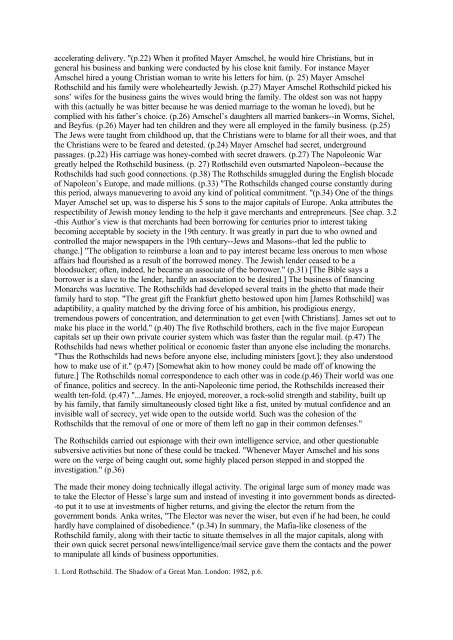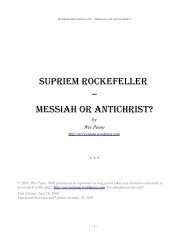Bloodlines of Illuminati
Bloodlines of The Illuminati - S pirit S elf
Bloodlines of The Illuminati - S pirit S elf
- No tags were found...
You also want an ePaper? Increase the reach of your titles
YUMPU automatically turns print PDFs into web optimized ePapers that Google loves.
accelerating delivery. "(p.22) When it pr<strong>of</strong>ited Mayer Amschel, he would hire Christians, but in<br />
general his business and banking were conducted by his close knit family. For instance Mayer<br />
Amschel hired a young Christian woman to write his letters for him. (p. 25) Mayer Amschel<br />
Rothschild and his family were wholeheartedly Jewish. (p.27) Mayer Amschel Rothschild picked his<br />
sons’ wifes for the business gains the wives would bring the family. The oldest son was not happy<br />
with this (actually he was bitter because he was denied marriage to the woman he loved), but he<br />
complied with his father’s choice. (p.26) Amschel’s daughters all married bankers--in Worms, Sichel,<br />
and Beyfus. (p.26) Mayer had ten children and they were all employed in the family business. (p.25)<br />
The Jews were taught from childhood up, that the Christians were to blame for all their woes, and that<br />
the Christians were to be feared and detested. (p.24) Mayer Amschel had secret, underground<br />
passages. (p.22) His carriage was honey-combed with secret drawers. (p.27) The Napoleonic War<br />
greatly helped the Rothschild business. (p. 27) Rothschild even outsmarted Napoleon--because the<br />
Rothschilds had such good connections. (p.38) The Rothschilds smuggled during the English blocade<br />
<strong>of</strong> Napoleon’s Europe, and made millions. (p.33) "The Rothschilds changed course constantly during<br />
this period, always manuevering to avoid any kind <strong>of</strong> political commitment. "(p.34) One <strong>of</strong> the things<br />
Mayer Amschel set up, was to disperse his 5 sons to the major capitals <strong>of</strong> Europe. Anka attributes the<br />
respectibility <strong>of</strong> Jewish money lending to the help it gave merchants and entrepreneurs. [See chap. 3.2<br />
-this Author’s view is that merchants had been borrowing for centuries prior to interest taking<br />
becoming acceptable by society in the 19th century. It was greatly in part due to who owned and<br />
controlled the major newspapers in the 19th century--Jews and Masons--that led the public to<br />
change.] "The obligation to reimburse a loan and to pay interest became less onerous to men whose<br />
affairs had flourished as a result <strong>of</strong> the borrowed money. The Jewish lender ceased to be a<br />
bloodsucker; <strong>of</strong>ten, indeed, he became an associate <strong>of</strong> the borrower." (p.31) [The Bible says a<br />
borrower is a slave to the lender, hardly an association to be desired.] The business <strong>of</strong> financing<br />
Monarchs was lucrative. The Rothschilds had developed several traits in the ghetto that made their<br />
family hard to stop. "The great gift the Frankfurt ghetto bestowed upon him [James Rothschild] was<br />
adaptibility, a quality matched by the driving force <strong>of</strong> his ambition, his prodigious energy,<br />
tremendous powers <strong>of</strong> concentration, and determination to get even [with Christians]. James set out to<br />
make his place in the world." (p.40) The five Rothschild brothers, each in the five major European<br />
capitals set up their own private courier system which was faster than the regular mail. (p.47) The<br />
Rothschilds had news whether political or economic faster than anyone else including the monarchs.<br />
"Thus the Rothschilds had news before anyone else, including ministers [govt.]; they also understood<br />
how to make use <strong>of</strong> it." (p.47) [Somewhat akin to how money could be made <strong>of</strong>f <strong>of</strong> knowing the<br />
future.] The Rothschilds nomal correspondence to each other was in code.(p.46) Their world was one<br />
<strong>of</strong> finance, politics and secrecy. In the anti-Napoleonic time period, the Rothschilds increased their<br />
wealth ten-fold. (p.47) "...James. He enjoyed, moreover, a rock-solid strength and stability, built up<br />
by his family, that family simultaneously closed tight like a fist, united by mutual confidence and an<br />
invisible wall <strong>of</strong> secrecy, yet wide open to the outside world. Such was the cohesion <strong>of</strong> the<br />
Rothschilds that the removal <strong>of</strong> one or more <strong>of</strong> them left no gap in their common defenses."<br />
The Rothschilds carried out espionage with their own intelligence service, and other questionable<br />
subversive activities but none <strong>of</strong> these could be tracked. "Whenever Mayer Amschel and his sons<br />
were on the verge <strong>of</strong> being caught out, some highly placed person stepped in and stopped the<br />
investigation." (p.36)<br />
The made their money doing technically illegal activity. The original large sum <strong>of</strong> money made was<br />
to take the Elector <strong>of</strong> Hesse’s large sum and instead <strong>of</strong> investing it into government bonds as directed-<br />
-to put it to use at investments <strong>of</strong> higher returns, and giving the elector the return from the<br />
government bonds. Anka writes, "The Elector was never the wiser, but even if he had been, he could<br />
hardly have complained <strong>of</strong> disobedience." (p.34) In summary, the Mafia-like closeness <strong>of</strong> the<br />
Rothschild family, along with their tactic to situate themselves in all the major capitals, along with<br />
their own quick secret personal news/intelligence/mail service gave them the contacts and the power<br />
to manipulate all kinds <strong>of</strong> business opportunities.<br />
1. Lord Rothschild. The Shadow <strong>of</strong> a Great Man. London: 1982, p.6.




